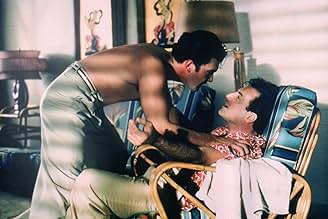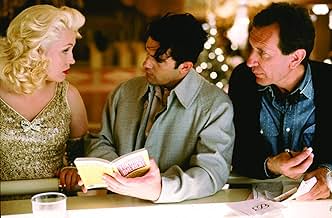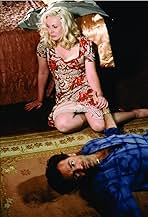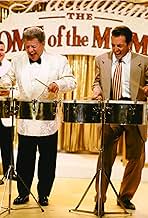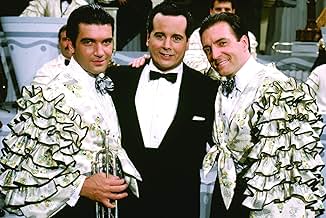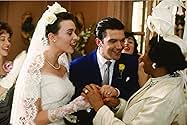NOTE IMDb
6,4/10
6,2 k
MA NOTE
L'histoire de deux frères musiciens qui fuient leur pays natal, Cuba, et rencontrent le succès sur la scène musicale du New York des années 50.L'histoire de deux frères musiciens qui fuient leur pays natal, Cuba, et rencontrent le succès sur la scène musicale du New York des années 50.L'histoire de deux frères musiciens qui fuient leur pays natal, Cuba, et rencontrent le succès sur la scène musicale du New York des années 50.
- Réalisation
- Scénario
- Casting principal
- Nommé pour 1 Oscar
- 6 nominations au total
James Medina
- Manny - The Mambo Kings Band
- (as Jimmy Medina)
Avis à la une
Two brothers flee Cuba in the early 50s in search of the American Dream playing mambo music. The older sibling, Cesar, is a natural showman and businessman (Armand Assante) whereas the younger brother, Nestor, is a reserved composer (Antonio Banderas). The women in their lives are played by curvy Cathy Moriarty and Maruschka Detmers.
"The Mambo Kings" (1992) is reminiscent of "The Cotton Club" (1984) mixed with the later "Pollock" (2000) and maybe a little "Dirty Dancing" (1987). While not quite as good as those, it's still worth checking out, especially if you like mambo or energetic Latin music in general, not to mention the setting of 50's America.
Assante is convincing, performing with charisma and gusto, while Banderas is effective as the sensitive and sincere younger sibling, although he's a far cry from the brooding Brando. This was Banderas' first English-speaking role; he learned his lines phonetically and worked with a dialect coach throughout pre-production and filming.
Too much of the movie takes place in clubs or apartments with people smoking, drinking and emoting for my tastes. But the story perks up in the third act with a notable sequence featuring Desi Arnaz, Jr. (I don't want to say more because I don't want to give anything away).
The film runs 1 hour, 44 minutes, and was shot in Los Angeles.
GRADE: B-
"The Mambo Kings" (1992) is reminiscent of "The Cotton Club" (1984) mixed with the later "Pollock" (2000) and maybe a little "Dirty Dancing" (1987). While not quite as good as those, it's still worth checking out, especially if you like mambo or energetic Latin music in general, not to mention the setting of 50's America.
Assante is convincing, performing with charisma and gusto, while Banderas is effective as the sensitive and sincere younger sibling, although he's a far cry from the brooding Brando. This was Banderas' first English-speaking role; he learned his lines phonetically and worked with a dialect coach throughout pre-production and filming.
Too much of the movie takes place in clubs or apartments with people smoking, drinking and emoting for my tastes. But the story perks up in the third act with a notable sequence featuring Desi Arnaz, Jr. (I don't want to say more because I don't want to give anything away).
The film runs 1 hour, 44 minutes, and was shot in Los Angeles.
GRADE: B-
10jimi99
Regarding the recent death of Latin superstar Celia Cruz, I was surprised by the lack of mention of her role in this film in the various obituaries and tributes I read. I don't know if she made movies in Cuba, but she was not only a powerful positive musical presence in "The Mambo Kings" but her character acting was outstanding and very charming. If you don't know anything about her and want to get an idea of who Celia Cruz was, see this movie.
And that is far from the only reason to do so. This is one of my favorite romantic films for adults, as opposed to the juvenile and/or formulaic fare that passes for romance in American cinema. Armand Assante should have been at least nominated for best actor that year, he is so strong and yet vulnerable and lovable as the big brother with a powerful code of honor to his art and his family. The other kid, who has gone on to bigger and not necessarily better things, is also fine, considering his well-publicized effort to deliver his lines phonetically, since he did not speak English at the time. (No, I'm not forgetting his earlier fine contributions to several Almodovar films.)
OK, Roscoe Lee Browne and Cathy Moriarty were a bit miscast, but what about the stroke of genius to have Desi Arnaz Jr play his father? The whole "I Love Lucy" segment of the film, while somewhat contrived in its importance to the story, is funny, well-done, and helps to bring the whole Cuban-American experience in New York into sharper focus, with the portrayal of Arnaz as both a superstar idol and a man very close to his roots.
The music is fabulous, both the use of classic Cuban tracks and new music recorded for the film. Among the latter, "Sweet Maria of my Soul," the theme song performed by both Antonio Banderas in the film and Los Lobos over the end credits, was nominated for Best Song but was beat out by some plastic Disney tune. It is so organic, so romantic and soulful, it should be a classic movie song for the ages. Well, it will be for me...
And that is far from the only reason to do so. This is one of my favorite romantic films for adults, as opposed to the juvenile and/or formulaic fare that passes for romance in American cinema. Armand Assante should have been at least nominated for best actor that year, he is so strong and yet vulnerable and lovable as the big brother with a powerful code of honor to his art and his family. The other kid, who has gone on to bigger and not necessarily better things, is also fine, considering his well-publicized effort to deliver his lines phonetically, since he did not speak English at the time. (No, I'm not forgetting his earlier fine contributions to several Almodovar films.)
OK, Roscoe Lee Browne and Cathy Moriarty were a bit miscast, but what about the stroke of genius to have Desi Arnaz Jr play his father? The whole "I Love Lucy" segment of the film, while somewhat contrived in its importance to the story, is funny, well-done, and helps to bring the whole Cuban-American experience in New York into sharper focus, with the portrayal of Arnaz as both a superstar idol and a man very close to his roots.
The music is fabulous, both the use of classic Cuban tracks and new music recorded for the film. Among the latter, "Sweet Maria of my Soul," the theme song performed by both Antonio Banderas in the film and Los Lobos over the end credits, was nominated for Best Song but was beat out by some plastic Disney tune. It is so organic, so romantic and soulful, it should be a classic movie song for the ages. Well, it will be for me...
I didn't expect to like this film, but I thought it was quite good. Latin music really isn't my cup of tea, but it was good here, set the tone just right. Armand Assante was great as Cesar Castillo. I haven't seen too much of his work, but I was very impressed. Antonio Banderas was pretty good here, not great. However, if it's really true that he couldn't speak English then, and learned his lines phonetically, then you'd have to compliment him on that. You really couldn't tell. Maruschka Detmers was also very good in a low-key role. I've been a fan of hers since "Hanna's War" Check that out if you haven't seen it. The ending was just a little off, but overall this movie was very entertaining.
When Cesar that his brother's woman married another man to save Nestor from being murdered, he decides that the time is right for them to leave Cuba and seek out their fortune in America. Arriving in a rainy New York, their relatives and friends already in NY scoff at suggestions that the brothers will walk straight into a downtown club with their music, however when Cesar is invited onto stage with Tito Puente at one such club, things look positive until a shooting spoils it all. As Cesar continues to chase his dream in his own way, Nestor finds himself dragged along, perhaps at the expense of his own dream desires.
Although I personally felt that the narrative could have been deeper and the characterisation more detailed, this film is lifted by the sense of place and period that delivers a glut of passion that runs across the whole film. Although it helps if you actually like the music and the culture, this energy is used well to help raise the material, which could easily have lapsed into soapy daytime melodrama. This is not to say that it doesn't do this occasionally but the film caught me up well to the point where I was engaged by their drama even while knowing it was a bit sentimental and (occasionally) contrived. Those happy to work at the melodrama level will easily enjoy this though because it is a superior example of that "genre" and Glimcher has done a good job of delivering the plot in a serious fashion.
Of course it helps that the main actors are so strong. Assante dominates the film simply because his character dominates his brother. He is full of fire and passion and he delivers the goods in a convincing way. However the more impressive performance is from Banderas. Although a more subtle character, the lack of English meant that he was delivering everything phonetically. I could not be convincing on screen in my own tongue so I can only imagine the challenge of delivering the dialogue while also being convincing emotionally. He nails it though. The two men also work well together and have a natural chemistry that was necessary to make convincing brothers. They own the film and support from Moriarty, Detmers and others never threatens them, although it is cool to have a cameo from Puente.
Overall then this is an enjoyable and energetic melodrama. It occasionally gets a bit too soapy but generally it is kept above this level mainly thanks to impassioned delivery from Assante and Banderas. Some viewers will be turned off by it for what it is but for a melodrama it was surprisingly good.
Although I personally felt that the narrative could have been deeper and the characterisation more detailed, this film is lifted by the sense of place and period that delivers a glut of passion that runs across the whole film. Although it helps if you actually like the music and the culture, this energy is used well to help raise the material, which could easily have lapsed into soapy daytime melodrama. This is not to say that it doesn't do this occasionally but the film caught me up well to the point where I was engaged by their drama even while knowing it was a bit sentimental and (occasionally) contrived. Those happy to work at the melodrama level will easily enjoy this though because it is a superior example of that "genre" and Glimcher has done a good job of delivering the plot in a serious fashion.
Of course it helps that the main actors are so strong. Assante dominates the film simply because his character dominates his brother. He is full of fire and passion and he delivers the goods in a convincing way. However the more impressive performance is from Banderas. Although a more subtle character, the lack of English meant that he was delivering everything phonetically. I could not be convincing on screen in my own tongue so I can only imagine the challenge of delivering the dialogue while also being convincing emotionally. He nails it though. The two men also work well together and have a natural chemistry that was necessary to make convincing brothers. They own the film and support from Moriarty, Detmers and others never threatens them, although it is cool to have a cameo from Puente.
Overall then this is an enjoyable and energetic melodrama. It occasionally gets a bit too soapy but generally it is kept above this level mainly thanks to impassioned delivery from Assante and Banderas. Some viewers will be turned off by it for what it is but for a melodrama it was surprisingly good.
THE MAMBO KINGS (1992) *** Armand Assante, Antonio Banderas, Cathy Moriarty, Maruschka Detmers, Desi Arnaz Jr. Flamboyant and fun watching film about two immigrant Cuban brothers in 1950s NYC trying to make the big time with their style and music. Banderas is particularly good as the heartbroken younger sibling and the soundtrack is memorably poignant and lavish set designs as well.
Le saviez-vous
- AnecdotesAntonio Banderas couldn't speak English when this movie was filmed, and thus performed all his lines phonetically. Armand Assante couldn't speak Spanish and also performed all his lines phonetically.
- GaffesWhen the Castillo brothers first approach New York City in the early 1950s, the World Trade Center towers are visible in the skyline; they weren't built until the early 1970s.
- Citations
Cesar Castillo: In the name of the Mambo, the Rumba, and the Cha cha cha.
- Versions alternativesThe DVD plastered the Warner Bros. Pictures logo with the 2003 logo.
Meilleurs choix
Connectez-vous pour évaluer et suivre la liste de favoris afin de recevoir des recommandations personnalisées
- How long is The Mambo Kings?Alimenté par Alexa
Détails
- Date de sortie
- Pays d’origine
- Langues
- Aussi connu sous le nom de
- The Mambo Kings
- Lieux de tournage
- Sociétés de production
- Voir plus de crédits d'entreprise sur IMDbPro
Box-office
- Budget
- 15 500 000 $US (estimé)
- Montant brut aux États-Unis et au Canada
- 6 742 168 $US
- Week-end de sortie aux États-Unis et au Canada
- 319 793 $US
- 1 mars 1992
- Montant brut mondial
- 6 742 168 $US
- Durée
- 1h 44min(104 min)
- Couleur
- Mixage
- Rapport de forme
- 1.85 : 1
Contribuer à cette page
Suggérer une modification ou ajouter du contenu manquant


